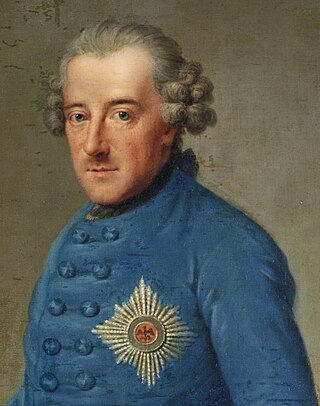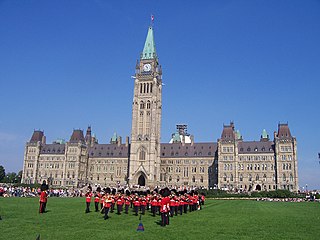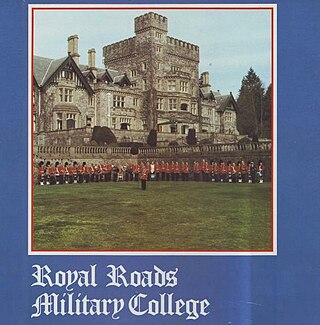
The War of 1812 was fought by the United States and its allies against the United Kingdom and its allies in North America. It began when the United States declared war on Britain on 18 June 1812. Although peace terms were agreed upon in the December 1814 Treaty of Ghent, the war did not officially end until the peace treaty was ratified by the United States Congress on 17 February 1815.

Wilhelm II was the last German Emperor and King of Prussia from 1888 until his abdication in 1918, which marked the end of the German Empire as well as the Hohenzollern dynasty's 300-year rule of Prussia.
The "Colonel Bogey March" is a British march that was composed in 1914 by Lieutenant F. J. Ricketts (1881–1945), a British Army bandmaster who later became the director of music for the Royal Marines at Plymouth. The march is often whistled. At the start of World War II, British soldiers sang the lyrics "Hitler Has Only Got One Ball" to accompany the tune.

Frederick II was the monarch of Prussia from 1740 until 1786. He was the last Hohenzollern monarch titled King in Prussia, declaring himself King of Prussia after annexing Royal Prussia from the Polish–Lithuanian Commonwealth in 1772. His most significant accomplishments include his military successes in the Silesian wars, his reorganisation of the Prussian Army, the First Partition of Poland, and his patronage of the arts and the Enlightenment. Prussia greatly increased its territories and became a major military power in Europe under his rule. He became known as Frederick the Great and was nicknamed "Old Fritz".

Frederick III was German Emperor and King of Prussia for 99 days between March and June 1888, during the Year of the Three Emperors. Known informally as "Fritz", he was the only son of Emperor Wilhelm I and was raised in his family's tradition of military service. Following the unification of Germany in 1871 his father, then King of Prussia, became German Emperor. Upon Wilhelm's death at the age of ninety on 9 March 1888, the thrones passed to Frederick, who had been German Crown Prince for seventeen years and Crown Prince of Prussia for twenty-seven years. Frederick was suffering from cancer of the larynx when he died, aged fifty-six, following unsuccessful medical treatments for his condition.
Second lieutenant is a junior commissioned officer military rank in many armed forces. The lowest officer rank, it is usually placed below lieutenant or first lieutenant.

The Rush–Bagot Treaty or Rush–Bagot Disarmament was a treaty between the United States and Great Britain limiting naval armaments on the Great Lakes and Lake Champlain, following the War of 1812. It was ratified by the United States Senate on April 16, 1818, and was confirmed by Canada, following Confederation in 1867.

Mobilization is the act of assembling and readying military troops and supplies for war. The word mobilization was first used in a military context in the 1850s to describe the preparation of the Prussian Army. Mobilization theories and tactics have continuously changed since then. The opposite of mobilization is demobilization.

The Navy Cross is the United States Naval Service's second-highest military decoration awarded for sailors and marines who distinguish themselves for extraordinary heroism in combat with an armed enemy force. The medal is equivalent to the Army's Distinguished Service Cross, the Air and Space Forces' Air Force Cross, and the Coast Guard Cross.

Frederick Joseph Ricketts was an English composer of marches for band. Under the pen name Kenneth J. Alford, he composed marches which are considered to be great examples of the art. He was a Bandmaster in the British Army, and Royal Marines Director of Music. Conductor Sir Vivian Dunn called Ricketts "The British March King". Ricketts' frequent use of the saxophone contributed to its permanent inclusion in military bands. His best known work is the "Colonel Bogey March".

The Kingston Royal Naval Dockyard was a Royal Navy Dockyard from 1788 to 1853 in Kingston, Ontario, Canada, at the site of the current Royal Military College of Canada.

Fort Wellington National Historic Site is a historic military fortification located on the north shore of the St. Lawrence River at Prescott, Ontario. The military fortification was used by the British Army, and the Canadian militia for most of the 19th century, and by the militia in the 20th century, until 1923, when the property was handed over to the Dominion Parks Commission, the predecessor to Parks Canada. The fort was earlier named a National Historic Site of Canada in January 1920.

Provincial Marine was a coastal protection service in charge of the waters in the Great Lakes, the St. Lawrence River and parts of Lake Champlain under British control. While ships of the Provincial Marine were designated HMS, they were operated in more of a coast guard manner than as a full-fledged navy. Most ships of the Provincial Marine were built on the Great Lakes.

The Royal Canadian Artillery Band is one of six Regular Force bands in the Canadian Armed Forces. Located at Canadian Forces Base Edmonton, the RCA Band provides music designed to support Canadian Forces operations, foster morale and esprit de corps, and promote Canada and the Canadian military nationally and abroad. The band operates mainly in western Canada and is de facto the representative band of the Canadian Army in the western provinces. All unit members are professional musicians in addition to being members of the military, which enables the band to adopt a variety of configurations to suit the musical needs of their audiences. Ensembles can range from jazz combos, rock bands, and chamber groups, through stage and show bands to full marching and concert bands.

Entrenching battalions were temporary units formed in the armies of the British Empire during the First World War. Entrenching Battalions were trained as infantry, but were primarily utilized for manual labour duties such as trench repair, wire laying, road making and assisting tunnellers, pioneers, engineers and signals. The Battalions were also used as pools of men from which drafts of replacements could be drawn by conventional infantry battalions.

The following events occurred in August 1917:

The Band of the Ceremonial Guard is an ad hoc military band that is attached to the Canadian Forces Ceremonial Guard in Ottawa. All members of the band are fully trained members of the Canadian Armed Forces (CAF) and consists of personnel principally from the two Foot Guards regiments and has even since 2007 been manned by a pan–Canadian Forces approach that is inclusive to musicians from the Royal Canadian Navy, Canadian Army and Royal Canadian Air Force. The band forms a separate company within the CG and rely on the Headquarters Company for administration and support personnel. In full composition, the band is active from April to August.

USRCSurveyor was a ship of the United States Revenue Marine captured by the United Kingdom during the War of 1812. Despite the vessel's loss, the "gallant and desperate" defense of her crew against a superior force of the Royal Navy and the Corps of Royal Marines is commemorated by the United States Coast Guard. Along with the Royal Navy frigate which bested her in battle, HMS Narcissus, Surveyor is among six legendary ships memorialized in the lyrics of the Coast Guard march "Semper Paratus".

The defense of the cutter Eagle was a battle on and around Long Island New York, that took place from October 10 to 13, 1814, between the British Royal Navy and the United States' Revenue Marine. Early on in the engagement, the United States' only involved vessel, USRC Eagle, was beached near Negro Head. Despite the loss of their ship, her crew continued fighting the Royal Navy vessels from shore using cannon recovered from their wrecked vessel. Eagle's crew was ultimately able to repair and refloat her, but unsuccessful in their attempts to drive the British ships away. Once more she was beached, but after exhausting their ammunition over three days of fighting, the Eagle's crew was unable to prevent her from being towed off by the Royal Navy, which then sailed her back past the shoreline for a victory lap. Though there were no fatalities on either side in the battle, a cow grazing in the area died after being hit by a 32-pound (15 kg) round shot fired by one of the Royal Navy ships.

The Royal Roads Military College Band was the college military marching band for the Royal Roads Military College in Hatley Park, near Victoria, British Columbia, Canada. It was formed in 1975. The band was disbanded in 1995 following the closing of Royal Roads Military College.


















